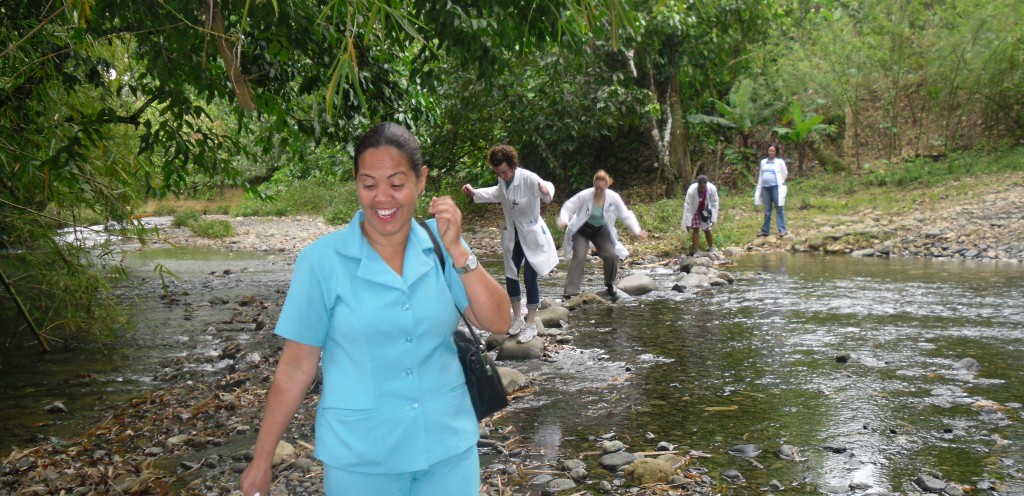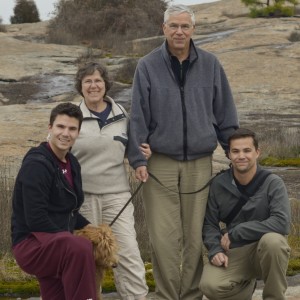Applauding Life: Compassionate Care in Global Health Midwifery
A Conversation with Jenny Foster, CNM, MPH, PhD
Associate Professor, Schools of Nursing and Public Health, Emory University
Julie: Jenny, it is such a delight to speak with you today and learn about your work in nursing, midwifery, and global health. As an anthropologist and Associate Professor in the Schools of Nursing and Public Health at Emory University you influence the lives of students both in the classroom and during international nurse training excursions. What led you to dedicate your life to this work?
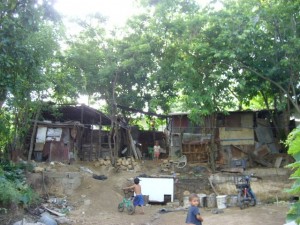 Jenny: I was first exposed to global health while on a trip to Peru after my senior year in high school. I was a research assistant for a project that was following children who had been rehabilitated from malnutrition. The children lived in horrific slums in Lima. After the rehabilitation period, we followed the children’s growth in height and weight over time. I was from Long Island and had not experienced this depth of poverty before. It caused me to realize the gravity of, and suffering from, income inequality.
Jenny: I was first exposed to global health while on a trip to Peru after my senior year in high school. I was a research assistant for a project that was following children who had been rehabilitated from malnutrition. The children lived in horrific slums in Lima. After the rehabilitation period, we followed the children’s growth in height and weight over time. I was from Long Island and had not experienced this depth of poverty before. It caused me to realize the gravity of, and suffering from, income inequality.
Next, I became involved in a project with the American Friends Service Committee (AFSC). At that point I was not yet a Quaker, but I was interested in social justice. The project was in a very poor part of Mexico. I worked in a village with a group of American and Mexican volunteers and, during this time, I realized I wanted to become a nurse.
While I was in the Peace Corps in Guatemala, I was surrounded by mothers and babies, and mothers birthing babies, who needed skills that I didn’t have. I was probably the most educated person in the area and was called on as an authority—but I really wasn’t an authority. I did what I could to help out because it had to be done. It was then that I realized I really wanted to be a public health midwife, and have an impact within communities such as these.
My early global health immersion experiences in places of deep poverty awakened me to the problems in Peru, Mexico, and Guatemala. But these health issues are everywhere—India, Afghanistan, Ethiopia. I heard recently at a conference, “Health isn’t everything, but if you don’t have it, you have nothing.” Health is fundamental to everything—being able to work, to parent, to live your life fully. The world needs healthy citizenry in order to 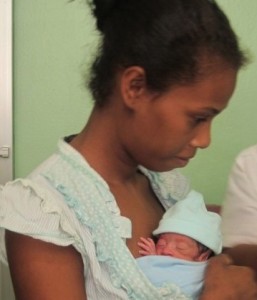 flourish. Having compassion includes acknowledging the essentials of health that are needed around the world, and recognizing that there are so many places that are still lacking clean water, vaccinations, sanitation… the very basics.
flourish. Having compassion includes acknowledging the essentials of health that are needed around the world, and recognizing that there are so many places that are still lacking clean water, vaccinations, sanitation… the very basics.
There is an image that still haunts me. A little baby about four or five months old died in the clinic in her mother’s arms from dehydration, an ailment completely preventable. We know how to address and cure a lot of health conditions that many people are still dying from. Global health looks at all of this unnecessary death and morbidity and works toward resolving the problems. My career is dedicated to training the next generation of nurses who will help end unnecessary suffering.
Julie: Who in your life inspired you and awaken a sense of compassion within you?
Jenny: My mother was very influential in helping me develop a global consciousness. She would say things like, “the rest of the world isn’t like this,” when we were at a fancy country club at the beach. I was very curious about this because “fancy country clubs” was the world I knew. I wondered, what else is out there? My mother was a very compassionate person. She was a very kind person, but she didn’t flaunt it. In the health profession, I’ve known lots of people who are incredibly compassionate, but the earliest influence was my mother.
After I had decided to become a nurse and a midwife, I discovered that both professions were full of people modeling compassion. For example, when I enrolled in midwifery school in the Mississippi Delta, I found some of the faculty amazing, truly! The Delta was culturally very different than Guatemala, but in terms of poverty and lack of high-tech medical services, it was very much like Guatemala. The midwives in Mississippi provided such wonderful, compassionate, and excellent care. By the time I entered the school, the area had ambulances, but many of the faculty had worked in rural Mississippi at a time when, if you had a complication, you put someone in the back of your Volkswagen and drove several counties over to get them to a hospital. These midwives modeled the best of midwifery, and I found their work and presence affirming my decision to enter this profession.
The fundamental role of nursing is compassion. Even though there is technology and science of all kinds in medicine, the best nursing includes, either literally or figuratively, holding someone’s hand through their care process. If you think back to the Civil War nurses, there wasn’t much they could do other than give people good food, keep them clean, write letters to their family, and hold their hands. And this made people better, even though the nurses were lacking modern equipment, tests, antibiotics, and such. Compassionate care goes a long way toward healing.
Julie: Your ongoing query of “providing care in the context of resource constraints” seems to be grounded in compassion and social justice. Tell me about this work.
Jenny: I’m involved in community-based research. In an academic environment, colleagues want to know about your research trajectory and programs. For me, my interests move beyond the intellect and incorporate asking questions about compassion. How do you get people (students, nurses, communities) to care about who they are serving, and how do you sustain this care? During the first part of my career as a midwife, I was providing direct care to people and that was very fulfilling. As a Professor, I am asking the question, “How do you educate people to give good care so that the impact affects more than just the patient?” In nursing school we are trying to educate nurses in a holistic manner—evidence-based nursing coupled with compassion.
In 2004, I developed a partnership with a hospital in the Dominican Republic. I started out idealistic, with much enthusiasm and energy, and worked with the in-country nurses to improve care. Over the years it’s been really challenging. The people involved are wonderful, but I’ve seen a lot of bad patient care. Many undocumented Haitians come to the Dominican Republic to give birth. They are given care in the public system but they are treated as inferior, one rung lower than poor Dominicans.
But I’ve also seen very good care. There was an instance when I was with a group of Dominican nurses and my nursing students, and a Haitian woman went into labor. All eight of the students wanted to be part of the delivery because the birthing process is so exciting. This mother was lying on a bed without medicine, monitors, or anything else you might expect in a modern hospital. She was quiet and the students were very helpful to the mother. The students were wiping her face with a washcloth and being wonderful supports. The nurses were giving her a lot of care and compassion and attention, perhaps more than she had received in a long time.
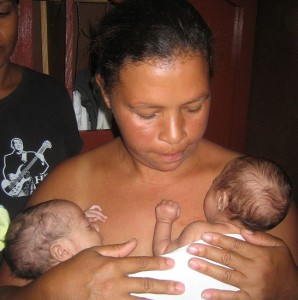 The baby was born healthy and the students were so elated that they broke into applause. Now, I don’t know how many times this Haitian woman has been applauded, perhaps not a lot. She was proud and she beamed a beautiful smile. I believe moments such as these, moments filled with empowerment and compassion, have a huge impact. Have we changed the healthcare system because of this? Probably not. Have we impacted the lives of this mother, the students, and the nurses in the room? Absolutely.
The baby was born healthy and the students were so elated that they broke into applause. Now, I don’t know how many times this Haitian woman has been applauded, perhaps not a lot. She was proud and she beamed a beautiful smile. I believe moments such as these, moments filled with empowerment and compassion, have a huge impact. Have we changed the healthcare system because of this? Probably not. Have we impacted the lives of this mother, the students, and the nurses in the room? Absolutely.
The community-based research has allowed me to bring two cultures together—the community people and the nurses in the hospital. We worked together trying to understand what’s happening in a community and how to help nurses and midwives become compassionate in the face of huge resource constraints.
Julie: What is it that sustains you personally?
Jenny: I’m a Quaker. Part of what drew me to Quakerism, the Religious Society of Friends, is their belief in understanding God through personal experience. In my life, I can see many times when God was working in me and through me, accompanying me on my journey. The definition of “midwife” is “being with women”; “mid” is Latin for “with” and “wife” is “women.” Midwifery, for me, is all about accompaniment of women. Accompaniment is spiritual, deeply spiritual. Public health practitioners don’t use words such as “spiritual” or “God,” but my work feels spiritual and it nourishes me.
Julie: What message do you have for young people who are thinking about entering the field or who are in the field of global health nursing?
Jenny: The young people with whom I am immersed are the future nurses of the world. One of the many things I love about Emory University is the global consciousness among students. I teach a course called “Birth and Global Health.” This fall I had eight nursing students and fifteen Emory undergraduate students. With a little bit of guidance from me, they developed their own projects to study some of the big global health questions, and their final presentations were wonderful. Also, many students now are going to rural places such as India and Bangladesh for their field experience. By immersing themselves in another culture, the students become more conscious of that particular culture, but also of the entire world. This fuels their interest in compassion and global health.
I would encourage students to figure out what sustains them. How will they retain their compassionate motivation in both resource-constrained areas such as the Dominican Republic, and in modern settings where too many patients, labs, and procedures overwhelm nurses? They will need to have self-compassion to maintain compassion for others. You can’t be a competent nurse if you are totally strung out. I would prefer to see people leave an environment, get restored and refreshed, and then return to nursing rather than burn out.
Personally, I maintain self-compassion by attending Quaker meeting for worship regularly. I also surround myself with people and animals who love me. And, I love my work, my students, and having a global impact. All of this nourishes me.
Jennifer Foster, CNM, MPH, PhD, is a public health nurse-midwife with a PhD in cultural anthropology. Her area of clinical expertise is maternity nursing, global midwifery, and interprofessional practice. Jenny’s research program is focused upon the improvement of maternal-newborn health globally, using anthropological and participatory methods. From 2008-2011, she conducted a community-based participatory research study in the Dominican Republic, supported by the National Institute of Nursing, which led to a team-based, interprofessional and community action project for improved maternal care.

